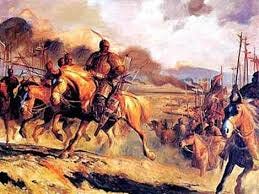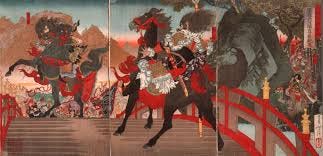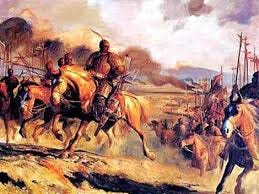The Iliad of Asia: The Romance of the Three Kingdoms China's Second Greatest Literary Epic - The Collapse of Empire and the Rise of Successor Kingdoms
I love this novel
Introducing the Tale
One of the greatest works of Chinese Literature is that of Romance of the Three Kingdoms. It is no exaggeration to say it is China’s Iliad, and that what it did for China was the same sort of thing that the Iliad did for Greece. It is perhaps the second greatest of her epics with the finest being probably the Journey to the West, which was China’s Odyssey in a lot of ways.
The story has enchanted that remarkable nation since its first inception and has remained justifiably a source of pride for all of Asia. It has been adapted into novels, movies, operas, songs, theatre-plays, cartoons and anime, and radio-dramas and what have you.
There are not enough words in English, French, Mandarin, Japanese or any other language under Heaven so to speak to describe how glorious and wonderful it is. This is why any undertaking to annotate it is a years long process and sure to be a lengthy project, one that I’m I must admit quite eager to undertake as it is a great tale.
The story was written during the Ming period in Chinese history, with the Ming being the ones who drove out the Mongols from China. It was they who undertook the lengthy process of trying to rebuild much of Asia after the calamitous period in which Genghis Khan and his heirs ravaged it with a demonic fury that’s not been seen since then (until the 20th century that is when the dogs of war were unleashed and every nation in Asia was torn asunder).
The writer was Luo Guanzhong, lived from possibly 1330-1400 A.D. (the exact date is still hotly debated), anyways he was to prove himself the Shakespeare of China and was a man of ‘minor’ importance during his time and was likely a local man who wrote and awed those around him with his literature even back then so that he met at least one famous playwright from that era.
His story is one that is concerned with the period from circa 185 A.D. to the end of the War of the Three Kingdoms of Shu-Han, Sun-Wu & Cao-Wei (later Sima-Wei after 250 A.D.) around 265 A.D.
The text lionizes Liu Bei the founder of Shu-Han, with Liu Bei having been an ambitious mercenary who served under a variety of lords before he finally betrayed a supposed cousin of his, usurping him and taking over his lands in the region near the city of Chengdu. Liu Bei in the story by Guanzhong though isn’t anything like his fascinating historic counterpart and yet is still an interesting figure. He’s portrayed as considerably more heroic if less brilliant in my view (the historic Liu was a genius military fellow and one of the many great men of Chinese history).
The story also idealizes Liu Bei’s many companions, his sworn brothers, his strategist Zhuge Liang who historically was more of a bureaucratic official who achieved pre-eminence after Bei’s death.
As to Cao-Wei it is a kingdom that acts more like a ‘villain’ of sorts to Liu Bei and his ‘Rebel Alliance’ as Americans might call it. The thing though is that historically Cao-Wei was much more complicated than this with Cao Cao arguably being China’s answer to Gaius Julius Caesar. He was a brilliant military commander who revolutionized the administration and smashed his rivals to pieces in his hurry to unite the north of China.
He did not usurp the Emperor though and passed away in 220 A.D. and was succeeded by his remarkable son Cao Pei, who went on to usurp the Emperor and demonstrate a certain brilliance and flair. The trouble with Pei was that he died too soon, and too suddenly to prevail over his rivals in the year 226 A.D.
All this is featured in this brilliant novel, with Sun Wu the third Kingdom really getting quite shafted in the book. Arguably it was they who did the most in the 205-218 or so period to resist Wei historically, with the Battle of Chibi/Red-Cliffs more a Wu victory by the likes of Huang Gai and the genius Zhou Yu (Wu’s finest commander and hero if we’re being honest) with Shu playing little more than second fiddle to them historically.
The trouble is that as great as RotTK is in terms of literature, it is also propaganda if we’re being honest. It is concerned with the glorifying of Liu Bei so that all opposed to him are villains or adjacent to that role. So that sadly Wu’s fine heroes such as Zhou Yu, Huang Gai, Sun Quan (in his early years) and Lu Meng are not as well treated as they should have been. It is a shame they are not better treated.
Though we should take heart, as plenty of adaptations have sought to correct the mistakes of Guanzhong and have sought to portray Zhou Yu not as envious of Zhuge Liang but the two as being mostly amicable even as the alliance between Wu-Shu breaks down on account of Shu’s seizure of lands without consultation with Sun Quan, and Lu Meng’s conquest of Jing province and the slaying of Guan Yu. Both acts that outrage Liu Bei.
But all that lies in the future of this narrative, as does that of the usurpation of the Imperial Cao clan so that the Sima clan might discard Wei for their own ‘Kingdom’ later Empire of Jin.
Now enough analysis of the history overview let’s get on with the start of the narrative (don’t worry I plan to guide the way through the historical events alongside the excellent literary narrative).
The Opening Scrawl
“On and on the Great River rolls, racing east,
Of proud and gallant heroes, its white-tops leave no trace,
As right and wrong, pride and fall turn all at once unreal.
Yet ever the green hills stay
To blaze in the west-waning day.
Fishers and woodsmen comb the river isles.
White-crowned, they’ve seen enough of spring and autumn tide
To make good company over the wine jar,
Where many a famed event
Provides their merriment.”
The story starts with this poem, and it is a beautiful one. It mostly rhymes and the rhythm is pretty good.
It seems to me to speak to the temporary nature of humans, to how short our lives are and the problem of pride. It is pride that brings down empires and nations, and tears apart our Civilizations. Always those up top become utterly conceited and convinced that they can master Nature, master the world around them and master fate itself only to fail, bring down all that they have built up and are then replaced by new elites and royal clans.
This is the way of history, as it is a cycle. It is an ultimately endless one that if we’re being honest Dear Readers, is one that is one long defeat, the Long Defeat of History if we’re being honest.
But do you want to know what is eternal?
The land, the mountains and Nature itself. Man could never conquer it. Never will, as Nature it has been said finds a way, but it is more than that it tends to resist our best efforts, and simply outlast us.
This poem is thus a very eloquent one about the disaster of ego and of decadence. It is a very apt way of also describing the last century or so of the Han Dynasty.
The Han were the dynasty that ruled from the period of around 300 BC to 220 or so A.D., and they had found China a war-ravaged, rebellious land. One that was ground down beneath the heel of the pompous, savage Qin Shi Huangdi, and had immediately set to work repairing his mistakes. Liu Bang had ruled well and had passed the crown successfully to his heir who did the same.
The Liu clan was to do this for centuries, building as they did so a robust administrative network, a stable standard of living and were to rule so well that it can honestly be compared with the height of Rome in terms of glory, stability and peace. It was a fine time to be alive when it reached its peak.
There were problems of course; they never fully mastered the Steppe Nomads known as the Xiongnu, and the line began to falter around the halfway mark in its history so that there was civil unrest, conflict and the like. But the Han had somehow endured and continued, so that by the time of 184 A.D. they had done so with remarkable success. However a century of misrule, corruption and incompetency had begun to take its toll.
The Han had always been a positive force until that last century, and they were to suddenly be rocked by disaster after disaster starting with the Yellow Turban Rebellion.
Guanzhong writes;
“The empire, long divided, must unite; long united, must divide. Thus it has ever been. In the closing years of the Zhou dynasty, 7 kingdoms warred among themselves until the kingdom of Qin prevailed and absorbed the other. But Qin soon fell and on its ruins 2 opposing kingdoms, Chu and Han fought for mastery until the kingdom of Han prevailed and absorbed its rival as Qin had done before. The Han court's rise to power began when the Supreme Ancestor slew a white serpent, inspiring an uprising that ended with Han's ruling a unified empire.”
This is how the story starts; with a history lesson. It is appropriate given that what happened was pretty much as he described it and also because this story follows after all these calamities.
“200 years later, after Wang Mang's usurpation, Emperor Guang Wu restored the dynasty and Han emperors ruled for another 200 years down to the reign of Xian, after whom the realm split into 3 kingdoms.”
Wang Mang was an usurper who as I hinted at earlier, usurped the throne of the Han during a restless period after the lengthy period (the golden age really) of rule by Emperor Wu (also known as Wudi). Wang Mang was to be quite honest a pretty good ruler in some ways, but suffered disasters died and his attempt to replace the Han failed. 200 years later the Kingdom fell apart after the reign of Xian, with the realm cracking and splintering into a variety of pieces before solidifying into 3 major Kingdoms.
“The cause of Han's fall may be traced to the reigns of Xian's 2 predecessors, Huan and Ling. Huan drove from office and persecuted officials of integrity and ability, giving all his trust to his eunuchs.”
Now for those familiar with Roman history, remember how bad Commodus was? Remember how terribly he ran things and his officials did, and how he slew or chased away all men of integrity and competency? Yeah, imagine having two of him. Interestingly there was a Roman envoy who made it as far east as China during the reign of Emperor Huan, one that was sent by the Roman Princeps (Emperor) Marcus Aurelius.
What is so fascinating is that though intelligent, Huan was incompetent and lacking in wisdom, whereas Aurelius was wise and temperate and intelligent. He was just blind in matters where his son was concerned. So that the two could not be more different, the trouble is that Aurelius’ legacy would become utterly tarnished when he would select his son Commodus as his heir so that his reign though a high-point in some ways of Roman glory and history was to begin the precipitous collapse of Rome (in almost the exact same years that the Han collapsed, as beginning around 180-240 Rome was to shatter, just as the Han was to begin collapsing from around 184-220 only for both Empires to rally and to give way to new dynasties, and for Jin to collapse in 326 while Rome saw disasters shatter them starting in 406-476).
That’s right to bring down the Han it took two Commoduses. Though in their case one of them was someone who empowered of all things Eunuchs. The bane of any good policy makers (save in rare cases) Eunuchs then just as they are now, are people who tend to be effeminate, and to lack wisdom and self-restraint for some reason. They are bringers of disaster and after them the deluge in a lot of cases with Huan propping them up against his rivals.
As to Ling he was truly a wastrel on par with Commodus. He wasted countless tribute and tax-money on his gardens, caring little for the warnings of his people and his advisors so that he gave corruption a bad name.
His was one of the worst Emperors throughout Chinese history. He was so cumbersome a ruler, so terrible that even the most loyal of subjects concluded by the end that something had to be done about him.
To have empowered Eunuchs in the way Huan had was a travesty. To do so as Ling now did and to proceed with his mad projects without consideration for the manner in which his Empire was collapsing could only be described as a crime.
But my favourite of the ‘lines’ from this opening of the story is that of; “The empire, long divided, must unite; long united, must divide. Thus it has ever been.”
It is portentous, it is wise and it is also sorrowful. It is also the Truth. We live in a Fallen World if we’re being honest. It is a world in which ALL Empires fall. Those that are divided must unite, and usually do come together, rallying for one last golden age only to later divide and collapse.
Gwanzhong wasn’t simply commenting on what happened to the Xia Dynasty, or the Shang Dynasty or the Zhou Dynasty, or to the Qin, or Han, or the Tang centuries after them or even the wealthy Sung or even still the Mongols but also committing to paper a prophecy one might say about the Ming and Qing.
So too one might say it fits with the Alexandrian Empire, the Seleukid one, the Roman Empire, and its successor states in the East known as the Eastern Roman, Byzantine and even Greek Empires, and the western Frankish Empire of Charlemagne and later its heirs France & the Holy Roman Empire.
Hopefully next time we’ll get into just how the Eunuchs screw things up and how the Yellow Turban Rebellion would utterly demolish the Han rulers of China and their authority.
But if you must be left with one lesson it is this…. Ling really did suck, screw him.
If you enjoyed this article though do feel free to donate to our Substack or Crowdfund. We’d greatly appreciate the support, the Crowdfund will allow you access to a number of published works while the Discounted Subscription will grant you access to ALL Bros Krynn novels, poems and older essays.
**********
Also Crown of Blood has a new edition, with maps, character bios and more!






My first exposure to the Three Kingdoms setting was through John Woo's epic film Red Cliff.
I had heard about Rot3K primarily through early Nintendo games. Thank you for explaining it in a more brief and concise format (as opposed to your recent post on the original LOTR).